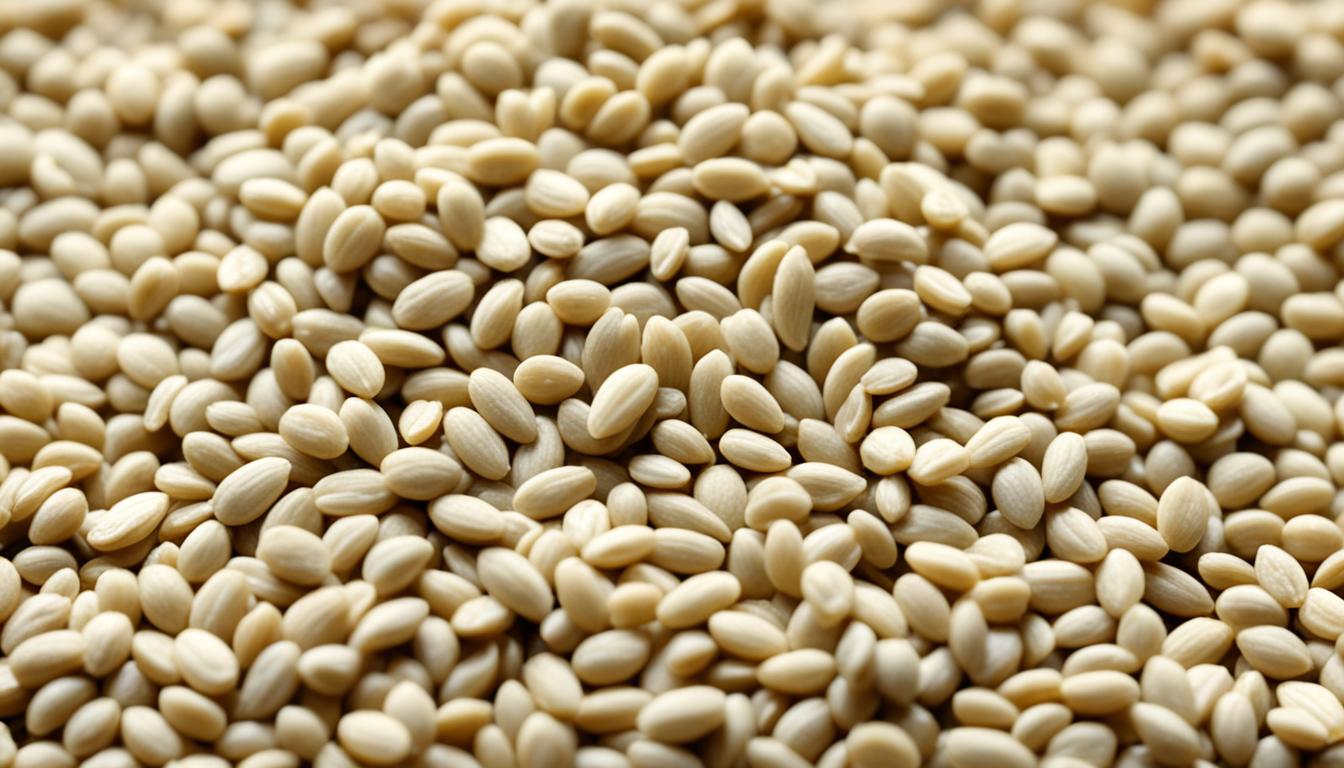I love trying new foods and I’ve always been drawn to sesame seeds. These small seeds have been loved for centuries. They’re great for adding crunch to baked goods and flavor to stir-fries. Sesame seeds are a key ingredient in many kitchens worldwide.
Sesame seeds come from the sesame plant and are small with a nutty taste. They can be white, black, or brown, each with its own use in cooking. These seeds are packed with nutrients, making them a great choice for health lovers.
In this article, we’ll explore sesame seeds more. We’ll look at where they come from, their health benefits, and how to use them in cooking. Whether you cook a lot or care about your health, you’ll see why sesame seeds are important.
What are Sesame Seeds?
Sesame seeds are tiny, packed with nutrients from the sesame plant (Sesamum indicum L.). This plant has been grown for thousands of years. It started in the Indian subcontinent and is now loved worldwide for its nutty taste and health benefits.
Origins and Varieties of Sesame Seeds
The sesame plant was first grown in India over 5,000 years ago. It spread to Asia and the Middle East through trade and sharing of cultures. The plant can produce different colored seeds, but the most common are:
- White sesame seeds – These have a mild, nutty taste and are the most widely used type.
- Black sesame seeds – With a slightly bitter flavor, black sesame seeds are often used in desserts and as a garnish.
- Brown sesame seeds – Featuring a nutty taste with a subtle bitterness, brown sesame seeds are commonly found in Middle Eastern and Mediterranean cuisines.
| Sesame Seed Variety | Flavor Profile | Common Uses |
|---|---|---|
| White Sesame Seeds | Mild, Nutty | Widely used in cooking and baking |
| Black Sesame Seeds | Slightly Bitter | Desserts, Garnishes |
| Brown Sesame Seeds | Nutty with Subtle Bitterness | Middle Eastern, Mediterranean Dishes |
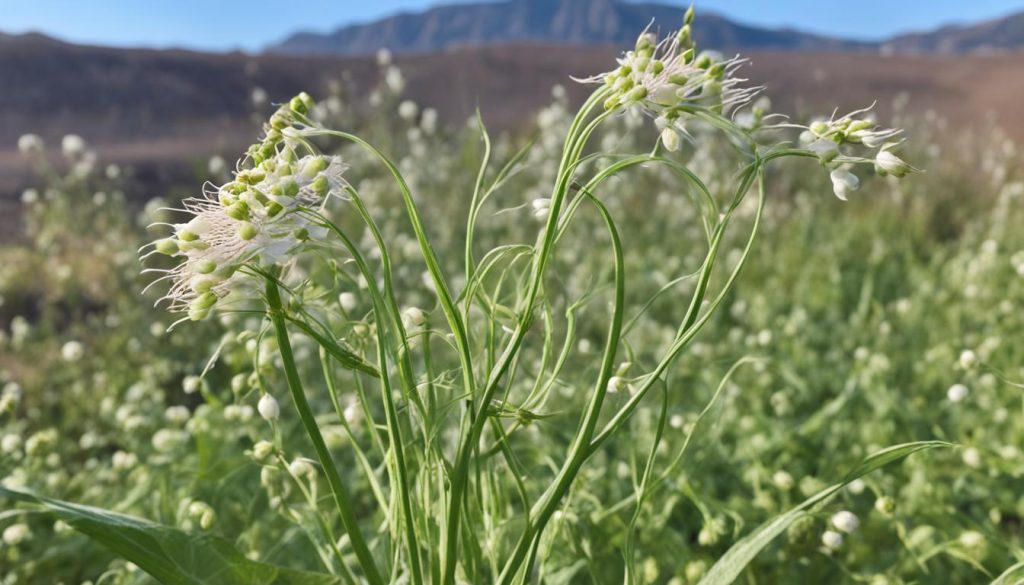
“Sesame seeds have been a part of the human diet for thousands of years, with evidence of their cultivation dating back to ancient Mesopotamia and the Indus Valley Civilization.”
Sesame Seed Nutritional Powerhouse
Sesame seeds are a nutritional powerhouse. They are full of essential nutrients. A one-ounce serving of these tiny seeds offers many benefits.
They have about 160 calories, 5g of high-quality protein, 4g of fiber, and 14g of healthy fats. These fats are good for your heart.
Sesame seeds are also packed with vitamins and minerals. They are a great source of:
- Calcium (28% of the daily recommended intake)
- Iron (23% of the daily recommended intake)
- Magnesium (25% of the daily recommended intake)
- Phosphorus (18% of the daily recommended intake)
These seeds have a lot of B vitamins too. These vitamins are important for your body’s processes and metabolism. Adding sesame seeds to your meals is a great way to get these nutrients. It helps support your health and well-being.
“Sesame seeds are a nutritional powerhouse, providing a wide range of essential vitamins, minerals, and healthy fats.”
| Nutrient | Amount per 1 oz (28g) Serving | % Daily Value |
|---|---|---|
| Calories | 160 | – |
| Protein | 5g | 10% |
| Fiber | 4g | 14% |
| Calcium | 280mg | 28% |
| Iron | 4.2mg | 23% |
| Magnesium | 100mg | 25% |
| Phosphorus | 180mg | 18% |
Health Benefits of Sesame Seeds
Sesame seeds are more than just a tasty addition to our meals. They are powerhouses of nutrition, offering many health benefits. These tiny seeds support our overall well-being in many ways.
Heart Health and Cholesterol Management
Sesame seeds are full of healthy fats like oleic acid and linoleic acid. These fats are key for heart health. They help manage cholesterol by blocking the bad kind from getting into our blood.
Phytosterols in sesame seeds also help with this. They make sesame seeds a great ally against heart disease.
Digestive Health and Fiber Content
Sesame seeds are a great source of dietary fiber. Fiber is key for a healthy digestive system. It helps with bowel movements, prevents constipation, and boosts digestive health.
It also helps keep blood sugar levels stable and aids in weight management.
Antioxidant and Anti-Inflammatory Properties
Sesame seeds are full of antioxidants like sesamin and sesamolin. These protect our cells from free radicals. They also reduce inflammation and lower the risk of chronic conditions.
By eating sesame seeds, we can use these natural compounds to support our health.
| Health Benefit | Key Nutrients in Sesame Seeds |
|---|---|
| Heart Health and Cholesterol Management | Oleic acid, linoleic acid, phytosterols |
| Digestive Health and Fiber Content | Dietary fiber |
| Antioxidant and Anti-Inflammatory Properties | Sesamin, sesamolin |
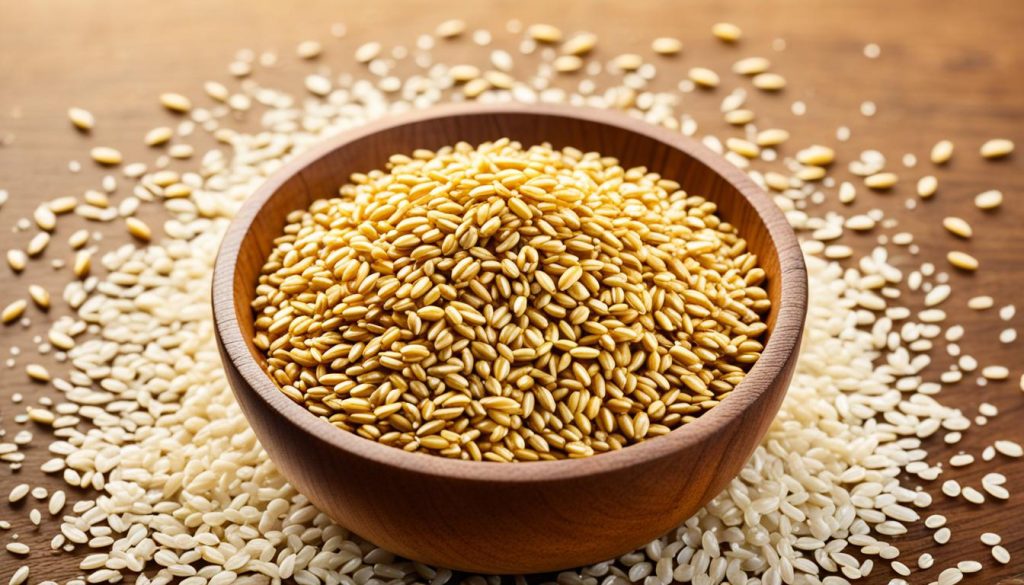
“Sesame seeds are a true nutritional gem, offering a range of health benefits that can positively impact our well-being from head to toe.”
Culinary Uses of Sesame Seeds
Sesame seeds are very useful in many dishes, both sweet and savory. They add a rich, nutty flavor with sesame oil and a creamy texture with tahini. These tiny seeds open up many cooking possibilities.
Savory Sesame Delights
In savory dishes, sesame seeds are great as a garnish, coating, and seasoning. They add a crunchy texture and nutty taste when roasted and sprinkled on salads, rice, and stir-fries. Sesame oil is key in Asian cooking for sautéing and dressing dishes. Tahini, a paste from ground sesame seeds, is vital in making hummus and tasty sauces.
Sweet Sesame Treats
Sesame seeds are also used in sweet foods, adding a special flavor. They’re found in sesame-coated breads and cookies, and even in desserts. Delicious treats like sesame brittle, halva, and ice cream show how versatile these seeds are.
| Culinary Use | Examples |
|---|---|
| Sesame Oil | Stir-fries, marinades, dressings |
| Tahini | Hummus, sauces, dressings |
| Sesame Snacks | Salads, rice dishes, baked goods |
| Sesame Coating | Breads, cookies, savory snacks |
| Sesame Garnish | Sushi, noodles, stir-fries |
| Sesame Desserts | Sesame brittle, halva, ice cream |
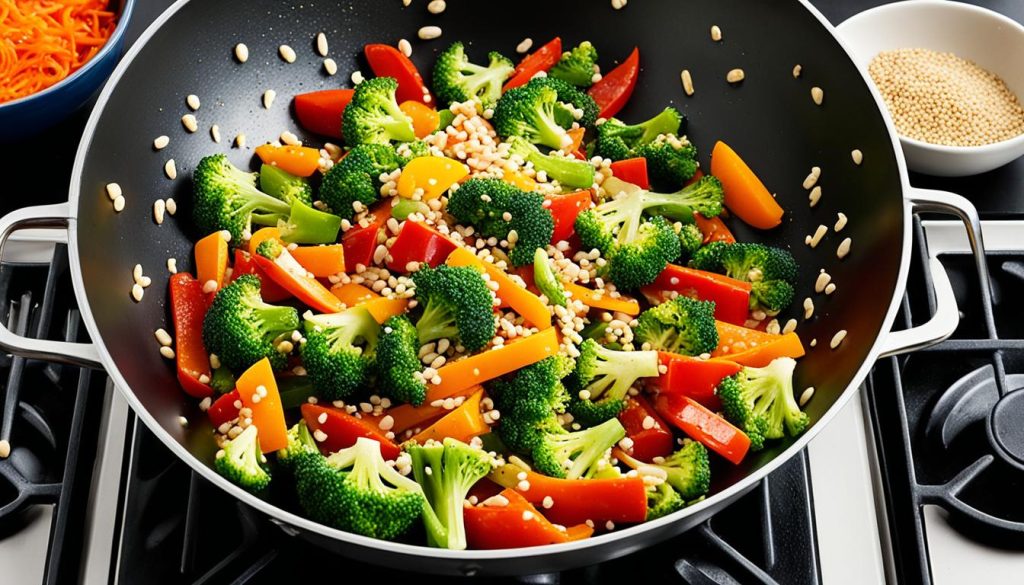
Sesame seeds are great for both savory and sweet dishes. They add a crunchy texture, rich nutty taste, or creamy texture to many foods. These tiny seeds can make any dish better.
Sesame Seed
Sesame seeds are tiny but packed with nutrients. They are full of healthy fats, protein, fiber, vitamins, and minerals. These seeds have been valued for their nutrition for centuries in many cuisines.
Sesame seeds are high in good fats that are good for the heart. They also have a compound called sesamin. This compound might help fight inflammation and act as an antioxidant.
| Nutrient | Amount per 1 Tbsp (9g) of Sesame Seeds |
|---|---|
| Calories | 52 |
| Total Fat | 4.5g |
| Protein | 2g |
| Carbohydrates | 2g |
| Fiber | 1g |
| Calcium | 88mg |
| Iron | 1.1mg |
| Magnesium | 39mg |
| Phosphorus | 66mg |
Sesame seeds are not just nutritious, they’re also versatile. You can use them in both sweet and savory dishes. They add a crunchy texture and a nutty taste. You can sprinkle them on salads, cereals, or mix them into baked goods and sauces.
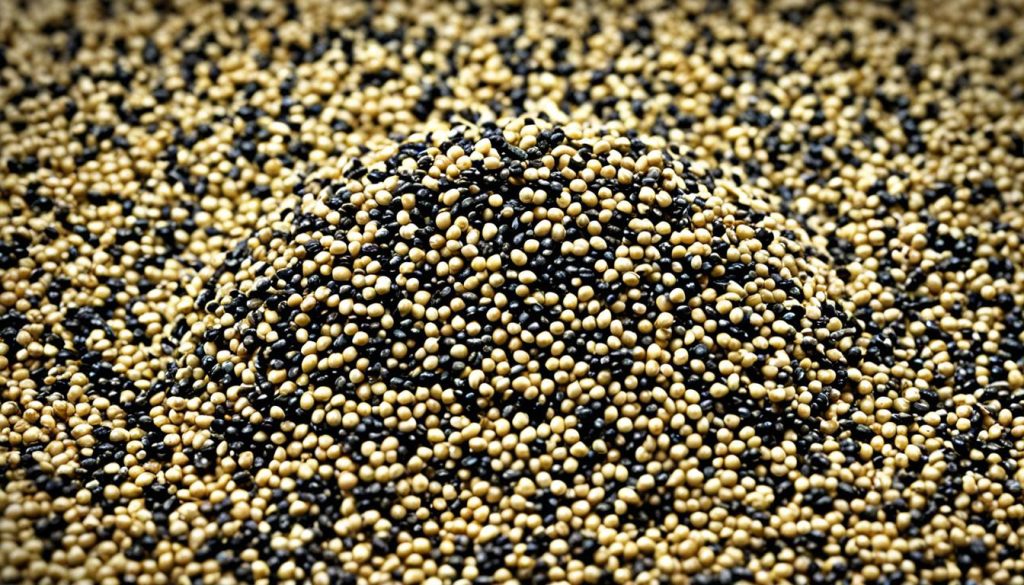
Adding sesame seeds to your meals is a tasty way to get more nutrients. They support heart health and add texture and flavor. These tiny nutritional powerhouses are easy and delicious to include in your diet.
Types of Sesame Seeds
I love sesame seeds for their variety. From white to black and brown, each type has its own taste and uses. They’re great for cooking and are good for you too.
White sesame seeds are the most common. They taste mild and nutty. They’re perfect for sweet and savory dishes. You’ll find them in bread, pastries, and even in stir-fries.
Black sesame seeds have a strong nutty flavor. They’re often used in Asian cooking. They add flavor to desserts and savory dishes like black sesame paste.
Brown sesame seeds taste sweet and a bit bitter. They’re popular in Middle Eastern and Mediterranean food. Their flavor goes well with spices and herbs.
All sesame seeds are full of good stuff like fatty acids, protein, fiber, and antioxidants. Using different types in your cooking can make your food taste better. It also brings health benefits.
“Sesame seeds are the unsung heroes of the culinary world, adding depth and dimension to a wide array of dishes.”
Buying and Storing Sesame Seeds
Sesame seeds are great for any pantry. They are nutritious and versatile. To get the best from these tiny seeds, know how to buy and store them right.
Choose whole sesame seeds over pre-ground ones. Whole seeds taste fresher and last longer. They have a nuttier flavor.
Find fresh sesame seeds with a nice, toasted smell. Stay away from seeds that smell bad or old. They might not taste good anymore.
For top quality, buy from a trusted place. This could be a specialty food store or an online shop that sells high-quality, sustainable ingredients.
After buying your sesame seeds, store them well to keep them fresh. Put them in an airtight storage container like a glass jar or tin. Keep them in a cool, dry, dark spot.
This keeps the seeds’ oils from going bad. If they get too much heat, light, or air, they can spoil.
With the right way to buy and store, you can enjoy fresh sesame seeds for up to six months. Adding these seeds to your cooking and baking makes your dishes tastier and healthier.
Unlocking the Nutritional Benefits of Sesame Seeds
Adding sesame seeds to your meals is a great way to get their nutritional benefits. These small seeds are full of vitamins, minerals, and healthy fats. They help keep you healthy. You can add them to many dishes, making it easy to eat them every day.
Incorporating Sesame Seeds into Your Diet
Put sesame seeds on salads, stir-fries, or rice for a tasty crunch. Blend them into smoothies or use sesame oil for cooking. They also work well in sweet treats like energy balls and cookies.
For a quick sesame seed boost, mix them into yogurt or oatmeal. Roast them for a snack or add to baked goods. There are many ways to use these seeds in your cooking.
“Sesame seeds are a versatile ingredient that can be seamlessly integrated into both sweet and savory dishes, making it easy to enjoy their nutritional benefits throughout the day.”
By adding sesame seeds to your food, you get lots of health benefits. They help your heart and give you antioxidants. Eating sesame seeds is a tasty way to be healthier.
Potential Precautions with Sesame Seeds
Sesame seeds are usually safe for most people. But, it’s good to know a few things first. As a copywriting journalist, I’ll share important info about sesame seeds.
People with sesame seed allergies should be careful. They should not eat sesame seeds or products with them. Eating sesame seeds can cause mild skin issues or even severe reactions like anaphylaxis. Always check if you or your family have food allergies before eating sesame seeds.
Some folks might feel digestive sensitivity from eating too many sesame seeds. They have a lot of fiber and nutrients that can upset your stomach. This might lead to bloating, gas, or stomach pain. Start with a small amount and see how your body reacts before eating more.
There’s also the issue of oxalate content in sesame seeds. Oxalates can make kidney stones worse for some people. If you’ve had kidney stones or kidney problems, talk to your doctor before eating more sesame seeds.

